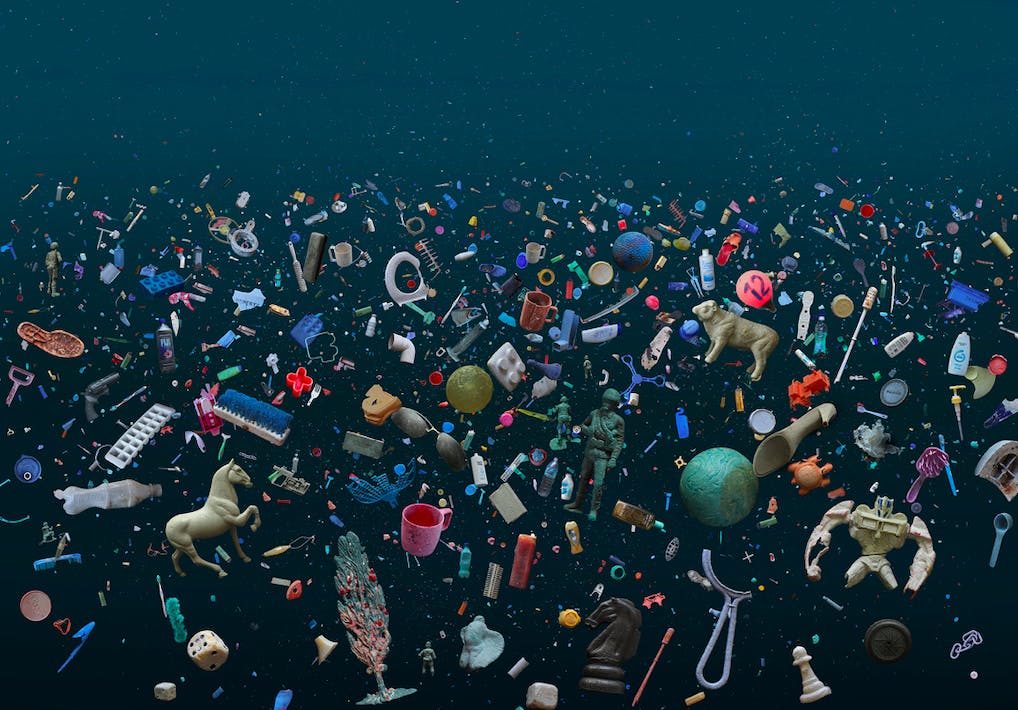
Mandy Barker, 25 Countries, from the series Shelf-Life, digital photograph, 2019.
Photo Credit

Mandy Barker, 25 Countries, from the series Shelf-Life, digital photograph, 2019.
Photo Credit
A series of photographs by international award-winning British artist Mandy Barker highlighting the impact of society’s reliance on plastic and the damage it causes to marine life and, ultimately, ourselves.
The photographs in Mandy Barker’s SHELF-LIFE series at first appear to be enticing images of underwater seascapes, but on closer inspection they contain a shock: they are constructed from thousands of pieces of plastic rubbish collected from the beaches of a remote island in the Pacific.
When a team of scientists and the artist visited the uninhabited and isolated Henderson Island, part of the Pitcairn Islands, in 2019, they documented massive quantities of plastic waste. In order to highlight this environmental degradation, Barker used pieces of this debris, which was made up of at least 45 major recognised brands from 25 different countries, to create images that suggest an infinity of floating plastic.
The work aims to provoke a response from viewers by raising awareness of plastic pollution washed up on this UNESCO World Heritage site, which despite being isolated in the middle of the SouthPacific and more than 5,000km from the nearest landmass, harbours one of the highest densities of plastic found anywhere in the world.
Mandy Barker says, “The aim of my work is to engage with and stimulate an emotional response in the viewer by combining a contradiction between initial aesthetic attraction along with the subsequent message of awareness.”
Mandy Barker is an international award-winning photographer whose work involving marine plastic debris has received global recognition for more than 10 years. Working with scientists, she aims to raise awareness about plastic pollution in the world's oceans, highlighting the harmful effect on marine life and ourselves.
In June 2019 Barker took part in the ‘Henderson Island Plastic Pollution Expedition’ which has been awarded the title of an ‘Explorers Club Flag Expedition’. With only 3-5 expeditions per year recognised in this way – previous others having included the Apollo 11 Space Mission, and the dive to Challenger Deep – this significant achievement included recording data as well as photographing marine plastic pollution, has now become part of the archives, accessible to other modern-day explorers and scholars.
Barker's work has been published in more than 50 different countries and she is a recipient of the 2018 National Geographic Society Grant for Research and Exploration. Barker is a member of the Union of Concerned Photographers (UCP), which is dedicated to using the power of imagery to underline the urgency of environmental concerns.
A series of photographs by international award-winning British artist Mandy Barker highlighting the impact of society’s reliance on plastic and the damage it causes to marine life and, ultimately, ourselves.
The photographs in Mandy Barker’s SHELF-LIFE series at first appear to be enticing images of underwater seascapes, but on closer inspection they contain a shock: they are constructed from thousands of pieces of plastic rubbish collected from the beaches of a remote island in the Pacific.
When a team of scientists and the artist visited the uninhabited and isolated Henderson Island, part of the Pitcairn Islands, in 2019, they documented massive quantities of plastic waste. In order to highlight this environmental degradation, Barker used pieces of this debris, which was made up of at least 45 major recognised brands from 25 different countries, to create images that suggest an infinity of floating plastic.
The work aims to provoke a response from viewers by raising awareness of plastic pollution washed up on this UNESCO World Heritage site, which despite being isolated in the middle of the SouthPacific and more than 5,000km from the nearest landmass, harbours one of the highest densities of plastic found anywhere in the world.
Mandy Barker says, “The aim of my work is to engage with and stimulate an emotional response in the viewer by combining a contradiction between initial aesthetic attraction along with the subsequent message of awareness.”
Mandy Barker is an international award-winning photographer whose work involving marine plastic debris has received global recognition for more than 10 years. Working with scientists, she aims to raise awareness about plastic pollution in the world's oceans, highlighting the harmful effect on marine life and ourselves.
In June 2019 Barker took part in the ‘Henderson Island Plastic Pollution Expedition’ which has been awarded the title of an ‘Explorers Club Flag Expedition’. With only 3-5 expeditions per year recognised in this way – previous others having included the Apollo 11 Space Mission, and the dive to Challenger Deep – this significant achievement included recording data as well as photographing marine plastic pollution, has now become part of the archives, accessible to other modern-day explorers and scholars.
Barker's work has been published in more than 50 different countries and she is a recipient of the 2018 National Geographic Society Grant for Research and Exploration. Barker is a member of the Union of Concerned Photographers (UCP), which is dedicated to using the power of imagery to underline the urgency of environmental concerns.